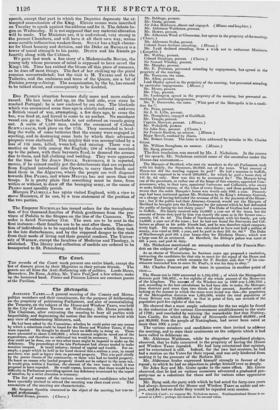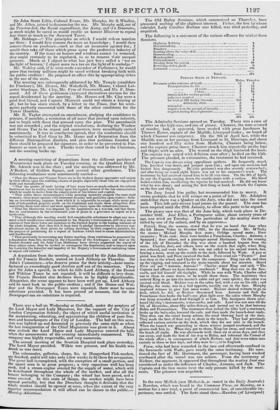Cbe etropoTIO.
ASSESSED TAXES.—A general meeting of the County and Metro- politan members and their constituents, for the purpose of deliberating on the propriety of petitioning Parliament, and also of memorializing the Treasury, on the subject of the House and Window Taxes, was held in the City of London Tavern on Wednesday ; Mr. Hume presided. The Chairman, after entreating the meeting to hear all parties with impartiality, and deprecating the notion that the meeting was held with any view of embarrassing Ministers, said, He bad been asked by the Committee, whether. he could point out any means by which a substitute could be found for the House and Window Taxes, if they were repealed. He thought he should have no difficulty in doing so. Those taxes amounted to about 2,500,000/. ; which amount might be saved out of the expenditure, and therefore no additional tax would be necessary. If; however, that could not be done, one or two other taxes might be imposed to make np the deficiency. The proceedings of the late Parliament had always tended to make taxation unequal. It taxed industry, instead of capital and wealth. For ex- ample, a paper which he held in his hand showed that a million a year, in round numbers, was paid as legacy duty on personal property. This was paid chiefly by the poorer classes of the community, or those who had no landed property. He knew no reason why landed property should not be subject to the same tax.. It would give, within a fraction, the amount of the two taxes which it was proposed to have repealed. He would repeat, however, that there would be no difficulty in Parliament providing against any deficiency occasioned by the repeal of taxation, by a strict attention to economy.
The list of names of the various members and candidates who had been specially invited to attend the meeting was then read over. The comments of the meeting are characteristic.
Mr. Sergeant Spankie concurred in the object of the meeting, but was en- professionally.
lonel Evans, present. ( Cheers.)
Mr. Babbage, present. Mr. Grote, present.
Sir John Hobhouse, absent and engaged. (Hisses andlaughter.)
Mr. Alderman Waithman, present. Mr. Hawes, present. Mr. Alderman Wood at Gloucester, but agrees in the propriety of the meeting.
(Cheers.)
Mr. Alderman Scales, present. Colonel Jones declines attending. (Hisses.) Mr. Lyall declined attending, from a wish not to embarrass Ministers.
(Laughter.)
Mr. Wakley, present.
Colonel Stanhope, present. ( Cheers.)
Sir Samuel Whalley, present. Mr. Murphy, present. Mr. E. Portman, prevented attending by engagements, but agreed in the propriety of the meeting. Mr. Tennyson, the same.
Mr. Allen, present.
Lord Henley agreed in the propriety of the meeting, but prevented attending by particular engagements. (Hisses.)
Mr. Moore, present. Mr. Clay, present. Dr. Lushington agreed in the propriety of the meeting, but prevented at- tending by particular engagements. Mr. T. Duncombe, the same. [What part of the Metropolis is he a candi- date for ?] Mr. Penn, present. Sir J. S. Lillie, present. Mr. Humphries, engaged at Guildhall. Mr. Temple, present.
Captain Marryat, present. (Hisses.)
Mr. Wakefield, present.
Sir John Key, present. (Cheers.) Sir Francis Burdett, no answer. (Hisses.)
Hisses.)
Major Revell, confined by illness. Mr. Robert Grant. The letter to him addressed by mistake to Mr. Charles Grant.
Mr. William Brougham, no answer. (Hisses.)
Mr. Byng, present.
The first resolution was moved by Mr. J. Nicholson. In the course of his speech, Mr. Nicholson noticed some of the anomalies under the House-tax assessment— The Marquis of Hertford, who sent six members to the old Parliament, took with his family, the Seymours, 20,0001. out of the taxes. What amount of House-tax did the meeting suppose he paid? He had a mansion in Suffolk, which was supposed to be worth 200,0001., for which he paid a house. duty of 141. 3s. 4d. only. How was this to be accounted for ? The Marquis being one of the governors, or rather one of the kings of this country, appointed Coin. missioners, who, in their turn, appointed Surveyors and Collectors, who swore to make faithful returns of the value of every house ; and those gentlemen had sworn that the noble Marquis's house was worth only 1001. a year. Proceed- ings had been instituted against Mr. Nicholson by the King's Attorney-General, on a charge of having defrauded the revenue of 2d. in the payment of the House- tax ; but if the public had their Attorney-General, would not the Marquis of Hertford be brought into the Exchequer for the amount which he had defrauded the public of during the last thirty years? The Duke of Grafton had a mansion in Suffolk. His family received only 15,0001. a year out of the taxes, but the amount of house-duty paid by him was exactly the same as in the former case— namely, 14/. 3s. 4d. The Duke of Northumberland, with his family, got only 14,000/. a year out of the taxes ; but be had not found the Surveyors and Col- lectors so pliant as his noble friends had, and he was therefore taxed compara- tively high. His mansion, which was calculated to have cost half a million of money, was rated at 2001. a year, and he paid in duty 281. 6s. 8d.* The Duke of Marlborough paid 40/. a year house-duty for Blenheim House; which was a large sum for an aristocrat. At Hereford, the Bishop's palace was rated at 60/. a year, and paid 51. duty.
Mr. Nicholson mentioned an amusing anecdote of Sir Francis Bur- dett on the subject of pledges— As an elector of Westminster, he fourteen years ago proposed a resolution, instructing the candidates for that city to move for the repeal of the House and Window Taxes ; upon which occasion Sir F. Burdett said, that "if his con- stituents instructed him to move St. Paul's, it was his duty to obey."
Mr. Charles Pearson put the taxes in question in another point of view—
The House-tax in 1830 amounted to 1,185,470/. ; of which the Metropolitan districts paid 780,4661., or five eighths of the whole amount of the House-tax of the kingdom. The ammnit of the Window-tax in 1830 was 1,190,705/. ; and, according to the best calculations he had been able to make, the Metropo- litan districts paid more than two thirds of that amount. Another mode of looking at the manner in which the taxes were levied was this—the population of the Metropolitan districts was 1,805,000, whilst the total population of Great Britain was 13,800,000; so that in point of fact, one seventh of the population paid five eighths of this tax.
He showed that a most ample substitute for the tax might be found in the reduction of the various Government establishments to the scale of 1792; and concluded by noticing the remarkable fact that Notting- ham Castle, for which the Duke of Newcastle claimed 40,000/., and got 30,000/. from the people of Nottingham, had never been rated at more than 100/. a year !
The various members and candidates were then invited to address the meeting, and to state their sentiments on the subjects which it had. been called to deliberate on.
Mr. Alderman Waithman, while he altogether repudiated pledges, observed, that he fully concurred in the propriety of having the House and Window Taxes repealed. He had long entertained that opinion, and he entertained it still. Indeed, for the two last sessions, -he had had a motion on the Votes for their repeal, and was only hindered from. making it by the pressure of the Reform Bill. Mr. Alderman Scales expressed himself strongly in favour of the repeal; to which he had no objection to pledge himself ever so deeply.
Sir John Key and Mr. Grote spoke to the same effect. *Mr. Grote- observed, that he had on various occasions advocated a graduated pro- perty-tax as a substitute for these and for various other oppressive' imposts.
Mr. Byng said, the party with which he had acted for forty-two years had always denounced the House and Window Taxes as unfair and un- just, an.d.ae had no doubt they would be repealed next session.
• Alnwick Castla, we suppose Mr. Nicholson means. Northumberland House is as-
sessed at 1,0001.; perhaps one of its animal value.
Sir John Scott Lillie, Colonel Evans, Mr. Murphy, Sir S. Whalley, and Mr. Allen, joined in denouncing the tax. Mr. Murphy said, out of the Pension-list, the Royal expenditure, the Army, and the Sinecures, as much might be saved as would enable an honest Minister to repeal four times as much as the Assessed Taxes.
Mr. Babbage—" The principles on which I would reduce taxation are these : I would first remove the taxes on knowledge ; I would then remove those on prudence—such as that on insurance against fire; I would then take off those which press upon the productive industry of the country. If the taxes on houses and windows cannot le removed, they ought certainly to be regulated, so as to remove their unequal pressure. Much as I object to what has just been called a tax on the light of heaven,' I object more to a tax on the light of knowledge."
Mr. Wakley said, if 1e were made a member of Parliament, he would prove that twenty millions might be saved without breaking faith with the public creditor ! He proposed to effect this by appropriating tithes to the use of the state.
The meeting was subsequently addressed by Mr. Temple (candidate for Finsbury), Mr. Hawes, Mr. Wakefield, Mr. Moore, Colonel Lei- cester Stanhope, Mr. Clay, Mr. Pym of Greenwich, and Mr. F. Ham- mond. All of these gentlemen expressed themselves anxious for the repeal desiderated by the meeting. Mr. Hawes and Mr. Clay were a good deal hissed, and Captain Marryatt could not obtain a hearing at all ; but he has since stated, by a letter in the Times, that his senti- ments perfectly concurred with those of the other candidates for the Tower Hamlets.
Mr. R. Taylor attempted an amendment, pledging the candidates to procure, if possible, a remission of all taxes that pressed upon industry, and to begin with those that pressed upon the poor. The amendment was not seconded ; and the original resolutions, declaring the Window and House Tax to be unjust and oppressive, were accordingly carried unanimously. It was in conclusion agreed, that the resolutions should be submitted to Earl Grey by Mr. Hume and a Deputation from the different Metropolitan districts, and also that petitions founded on them should be prepared for signature, in order to be presented to Par- liament as soon as it met. Thanks were then voted to the Chairman, and the meeting broke up.




























 Previous page
Previous page